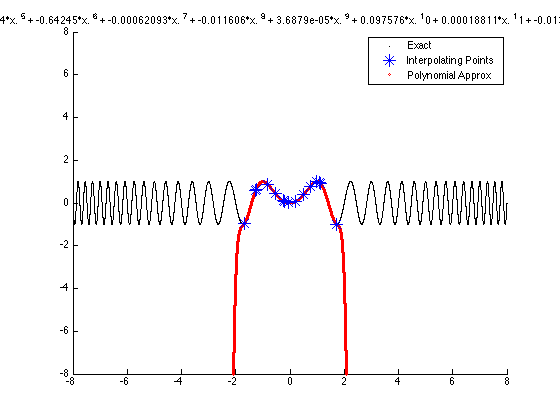Polynomial Data Fitting & Trigonometric Functions
Given a set of points sampled form a trig function in R^2, find the polynomial that contains them.
Contents
We choose random points on the graph of  .
.
x_given = -2+4*rand(1,15);
y_given = sin ((pi*x_given.^2 )/2);
%y_given = exp(x_given.^2);
n = length(x_given);
The "Coefficient" Matrix
The polynomial is a_0 + a_1*x + ... + a_m*x^m where m = n-1; This general form determines one equation for every given pair
M = ones(n,n+1); for point = 1:n for i = 1:n; M(point,i) = x_given(point)^(i-1); end M(point,n+1) = y_given(point); end
Solve the system
A = rref(M); a = A(:,end);
The polynomial
For example, y = a(1) + a(2)*x + a(3)*x.^2;
r = 8; % How wide is the range of the plotting window x = -r:.0001:r; % a sample of x values in the chosen range s = [num2str(a(1))]; % make a string out of the number held in a(1) % term by term, make a polynomial whose coeffs are taken from a for i = 2:length(a); % s is a character string that looks like the poly we want s = [s,' + ',num2str(a(i)),'*x.^',num2str(i-1)]; end % now we turn the character string into a set of y-values of the polynomial y = eval(s);
Plot the points and the curve in a psudo-animation
close all; % close all other figures figure; % create a new figure ylim([-r r]); % the max/min of the y-axis xlim([-r r]); % the max/min of the x-axis hold on % put all the plots onto the same figure title(s); % puts the string s into the title xx = [-r:.001:r]; % sample x-values, the domain of the function yy = sin((pi*xx.^2)/2); % the exact function %yy = exp(xx.^2); plot(xx,yy,'sk','MarkerSize',1) % plot the exact function in black legend('Exact') % create a legend pause % pause the printing for greater appreciation % Plot the given points as large blue stars, plot(x_given,y_given,'*b','MarkerSize',12); legend('Exact', 'Interpolating Points') pause % Plot the graph of the polynomial along with the given points plot(x,y,'or','MarkerSize',2); plot(x_given,y_given,'*b','MarkerSize',12); legend('Exact','Interpolating Points', 'Polynomial Approx')
